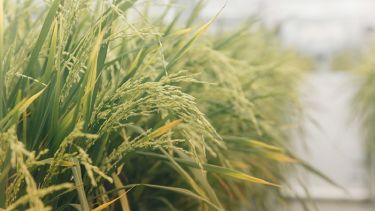Rice plants engineered to have fewer stomata – tiny openings used for gas exchange - are more tolerant to drought and resilient to future climate change, a new study has revealed.
Scientists from the University of Sheffield have discovered that engineering a high-yielding rice cultivar to have reduced stomatal density, helps the crop to conserve water and to survive high temperatures and drought.
Much of humanity relies on rice as a food source, but rice cultivation is particularly water intensive - using an estimated 2,500 litres of water per kilogram of rice produced. However, almost half of the global rice crop derives from rain-fed agricultural systems where drought and high temperatures are predicted to become more frequent and damaging under climate change.
Like most plants, rice uses microscopic pores called stomata to regulate carbon dioxide uptake for photosynthesis, along with the release of water vapour via transpiration. When water is plentiful, stomatal opening also permits regulation of plant temperature by evaporative cooling.
Under water-limiting drought conditions, stomatal closure normally slows down water loss. Low stomatal density rice conserves its water better under drought, and so has more water left to cool itself when necessary.
Dr Robert Caine, Research Associate from the University of Sheffield’s Department of Molecular Biology and Biotechnology and first author of the study, said: “Future predicted decreases in water availability, combined with increased frequency of extreme drought and high temperature events, are likely to present particular challenges for farmers - resulting in substantial crop loss.
“Our study has shown that rice plants with fewer stomata are drought tolerant and more conservative in their water use. This means they should perform better in the future under climate change conditions.
“We found that the engineered rice crops gave equivalent or even improved yields, which means it could have a massive impact on our future food security which is threatened by climate change.”
The new study, published today (Wednesday 25 July 2018) in New Phytologist and conducted in collaboration with the International Rice Research Institute in the Philippines, found low stomatal density rice lines used just 60 per cent of the normal amount of water.
When grown at elevated atmospheric carbon dioxide levels, the low stomatal density rice plants were able to survive drought and high temperature (40 degrees Celsius) for longer than unaltered plants.
Julie Gray, Professor of Plant Molecular Biology and lead author of the study, said: “Stomata help plants to regulate their water use, so this study could have a significant impact on other crops which are at risk under climate change.
“At the University of Sheffield we believe in a sustainable future and work towards solutions to the most pressing global challenges.”
This research was funded by the Newton Fund through the Biotechnology and Biological Sciences Research Council. The Newton Fund builds research and innovation partnerships with countries to support their economic development and social welfare.



